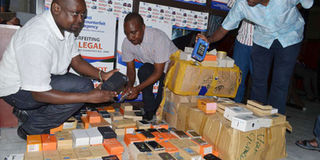Interagency efforts bear fruits in war on counterfeits

Anti-Counterfeit Agency officials on July 1, 2016 display fake mobile phones confiscated in Mombasa. Parents and learners have been cautioned to avoid buying fake textbooks. PHOTO | KEVIN ODIT | NATION MEDIA GROUP
What you need to know:
- Bogus goods are prevalent in Mombasa and Nairobi.
- The agency has also raised the alarm over bogus soft drinks and juices being sold in the country.
Counterfeit goods valued at Sh1.2 billion have been seized by the Anti-Counterfeit Agency in the past seven years.
Chief Inspector Caspar Oluoch said so far this year such goods worth Sh500 million have been destroyed.
He said that the cargo included electronic gadgets such as mobile phones and DVD players.
ILLEGAL SUGAR
Speaking at PrideInn Beach Resort in Mombasa during an international workshop on combating counterfeit products and piracy, Mr Oluoch said others include cigarettes, which had been imported from China and declared as cotton buds.
Seized in 2012, the cigarettes were valued at Sh43 million and were destroyed in Mombasa in 2014.
Also in 2014, he said two containers of illicit sugar were seized in the coastal county.
JOINT OPERATIONS
The sugar, he said, was imported from Brazil and then packed as a local brand to prevent detection.
Other impounded goods was half a container of rice imported from Pakistan that had also been branded as local.
He said the agency has been working with other institutions to tackle the problem.
"Through support from the customs administration, the police and other agencies, we have been able to prevent counterfeit cargo worth Sh1.2 billion from getting into the market," he said.
SOFT DRINKS
Mr Oluoch said the agency heightened the war against counterfeits to insulate Kenyans from harm that may arise from the use of such commodities.
"The counterfeit and illicit goods are not only dangerous to people’s health but also affect the business of local manufacturers," he explained.
The agency has also raised the alarm over bogus soft drinks and juices being sold in the country.
The fraudsters, the chief inspector said, escape suspicion by use bottles of popular soft drinks and fake security seals.
"The counterfeiters use hawkers to sell the juices, especially at bus terminuses and along the streets of towns," he said.
HOTSPOTS
Bogus goods are prevalent in Mombasa and Nairobi.
He called on consumers to be wary of what they purchase.
On the education front, he cautioned parents and learners to avoid fake textbooks and dictionaries that are mostly sold by hawkers.
BOOKSHOPS
He said the books do not have some pages, others are mixed up or placed wrongly while others carry words that are misspelt.
"It is better for parents to buy books from authorised bookshops and textbook dealers rather than buy books that are being hawked in the streets," he warned.
Mr Oluoch added that the agency is working with the Kenya Publishers Association and the Jomo Kenyatta Foundation Educational Publishers to address the challenge.




